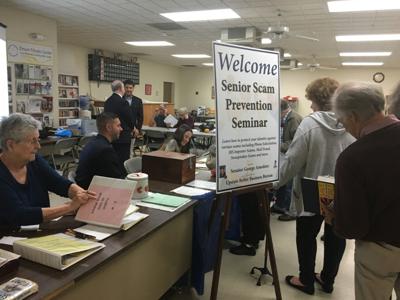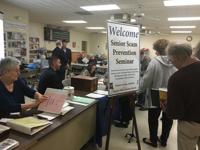Scammers are exploiting public anxiety over the COVID-19 pandemic and using the crisis as an opportunity to make money, state and local officials warn.
Elderly people, already the frequent targets of scammers, are at increased risk during this time of heightened anxiety, said state Attorney General Letitia James on Friday.
The attorney general’s office is tracking the latest scams, which include schemes to steal the $1,200 federal stimulus checks, census fraud and bogus coronavirus cures, James said on a call with the state chapter of the AARP.
“Scammers are very good at capitalizing on current events,” said state AARP Director Beth Finkel, who hosted the call.
Greene County Sheriff Peter Kusminsky said his office issued a warning after Greene County residents were targeted with a text message scam.
“The text claims that you have come in contact with someone who has tested positive or is showing symptoms of the coronavirus,” according to the sheriff’s office. “It says you must self-isolate and it directs you to click on a link for more information. Do not click on the link.”
The attorney general’s office has seen an uptick in attempts to exploit people’s confusion over the distribution of federal stimulus checks, James said.
“Beware of the phone calls, texts, emails and individuals going door to door asking for personal information in order to receive the $1,200 payment,” James said. “If anyone claims to be from the government, it may be nothing more than a scam to obtain your personal information. There is no fee to receive your $1,200 check.”
Columbia County Sheriff David Bartlett issued a warning to Columbia County residents awaiting stimulus money from the federal government.
“During times of crisis, people need to be extra vigilant,” Bartlett said. “There are people out there who are always looking to take advantage of these situations. Rely only on official sources. As usual, if something sounds too good to be true, it probably is.”
Those applying for unemployment benefits are at increased risk of fraud, officials from the state Department of Labor warned Monday. As part of its Call Back initiative, Labor Department employees are calling applicants to assist with benefits claims.
Labor Department employees are working remotely, which means they may show up as calling from a “private” number, state Labor Commissioner Roberta Reardon said in a statement. As New Yorkers apply for unemployment in record numbers, Reardon urged anyone applying for benefits to be wary of potentially fraudulent calls.
“To prevent fraud, anyone calling from the Department of Labor will verify their identity by providing the date you filed your unemployment insurance application and the type of claim you filed,” she said.
New scams are emerging daily to target the elderly, James said. The attorney general’s office is aware of scammers pretending to represent the Centers for Disease Control and Prevention who are offering bogus testing services and selling fake coronavirus cures, she said.
“There is no cure for coronavirus, there is no treatment, there is no vaccination,“ James said, noting that her office has also seen toothpastes and dietary supplements marketed as preventative treatments for the virus. Claims that products such as air purifiers can filter coronavirus out of the air are “not true,” she said.
In a continuing effort to crack down on attempts to exploit the public-health crisis, the attorney general’s office is soliciting information on price gouging. Over 5,000 complaints of price gouging have been lodged against companies and private individuals, and the attorney general’s staff is responding to each one, she said.
“My office has issued cease and desist letters to people selling essential supplies at high prices,” James said.
At this time, none of the price gouging cases have escalated to litigation.
James encouraged listeners on the AARP call to participate in the census and said to be wary of anyone claiming census participation costs money.
“The census is free, you do not need to pay a fee to fill out the census,” James said. Anyone who says otherwise is taking advantage of people’s anxiety and fear, she said.
The Census Bureau issued a reminder that census forms do not ask for Social Security numbers or bank account numbers. The state chapter of the Census Bureau can verify census surveys at 1-800-991-2520, officials said.
“When it comes to fraud, vigilance is our No. 1 defense,” said Finkel.









